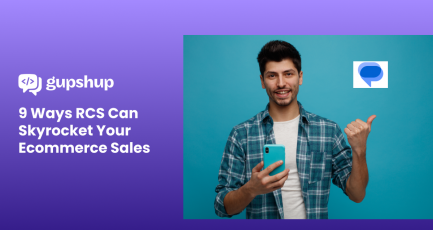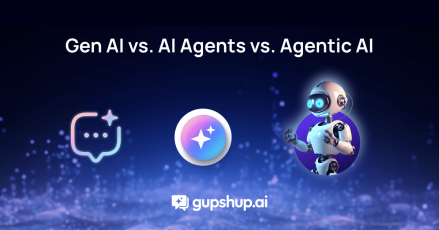How can Marketers Secure First-Party Database Without Cookies?

As Google phases out cookies, did you know Gupshup’s Conversation Cloud can keep your first-party data collection strategy efficient? Curious to find out how?
Cookies have long been the backbone of digital marketing strategies, offering businesses a way to track user behavior, gather insights, and deliver personalized advertising. This capability enabled marketers to fine-tune their campaigns, enhance user engagement, and drive conversions effectively. However, with the cookie era nearing its end marketers may find themselves at a crossroads. The absence of this valuable data source means a significant adjustment in how they identify, understand, and interact with potential customers.
As we transition to data collection methodologies and user interaction, it’s crucial to understand both the benefits that cookies once provided and the potential challenges of operating without them. This shift underscores the importance of developing robust first-party data strategies, not only to comply with increasing privacy regulations but also to maintain a competitive edge in a rapidly evolving digital landscape. Let’s delve deeper into what cookies offer, their impact, and how businesses can adapt to a future without them.
As we explore this change, we’ll see how leveraging WhatsApp marketing and Gupshup’s innovative solutions can help companies navigate these challenges with ease. By leveraging their first-party data, companies can create powerful marketing strategies in a world without third-party cookies.
Understanding the Shift from Third-Party Cookies
What are Third-Party Cookies?
Third-party cookies have been a cornerstone of digital marketing, enabling advertisers to track user behavior across different sites to target ads effectively and measure their impact. These cookies are set by domains other than the one a user is visiting, providing a wealth of information about user preferences and online activities.
Typically, when you visit a website and encounter the familiar “Allow Cookies?” prompt, opting in allows the site to remember your data. This data is crucial for crafting personalized experiences, such as targeted advertisements tailored to your preferences and online behavior. Currently, 75% of marketers globally rely on this mechanism to engage consumers with precision.
Recently, Google has initiated a significant change, committing to phase out cookies starting with 1% of Chrome users. This gradual removal will eventually impact all Chrome users by year’s end. This move has been anticipated, but now that it’s in motion, the need for an alternative strategy is undeniable—a strategy that must effectively serve marketers, advertisers, and consumers alike.
However, the transition to a cookieless world doesn’t spell the end of personalized user experiences but heralds a new era of innovation. The solution lies in conversational commerce, leveraging tools such as WhatsApp Business API, AI-powered WhatsApp chatbots and more.
1. Reasons for the Shift
The shift away from third-party cookies is largely driven by increasing privacy concerns and tightening regulations such as GDPR in Europe and CCPA in California. These changes reflect a growing demand from consumers for more control over their personal information and how it’s used online.
2. Impact on Marketers
The impending removal of cookies marks a disruptive shift for marketers, who have long depended on third-party data to deliver personalized advertisements. For marketers, the removal of third-party cookies challenges traditional ad targeting methods and necessitates a pivot to more reliable and ethical data sources. This transition impacts not only targeting but also attribution, retargeting, and personalization efforts across digital platforms.

The Rise of First-Party Data
Definition and Importance
In a world where data is the new oil, leveraging first-party data well is key for businesses in offering personalized experiences and improving marketing outcomes. This type of data is gathered directly from your audience via owned channels and includes data from behaviors, actions, or interests demonstrated across your website, app, or CRM system. It is inherently more accurate, reliable, and compliant with privacy regulations than third-party data. This data is crucial because it’s gathered with consent and is highly relevant to your business. Consequently, many B2B marketers are turning to Customer Data Platforms (CDPs) to enhance the utility of their first-party data.
Advantages Over Third-Party Data
First-party data offers several advantages: it’s more accurate, collected with user consent, and is subject to fewer regulatory restrictions. It allows for deeper customer insights and more personalized marketing efforts that resonate better with audiences.
Leading companies like Amazon and Netflix have successfully harnessed first-party data to create highly personalized and engaging experiences that drive user retention and satisfaction. These case studies exemplify the power of first-party data in delivering tailored content and recommendations.
Gupshup’s Advertise provides a robust framework for building a high-quality first-party data strategy enabling high-intent prospects to engage with you through Ads that Click to WhatsApp, and Instagram. This can further reduce dependency on third-party cookies for retargeting and remarketing to cold leads within the chat window. By adopting these solutions, businesses can engage with customers directly and personally, ensuring tailored marketing thrives even in a cookieless future.

Let’s delve into how these strategies can be implemented to navigate and triumph in this new landscape.
Gupshup’s Role in Building First-Party Data
With years of expertise in the Conversational AI space, Gupshup is well-acquainted with the periodic challenges that brands encounter. Understanding the need for deeper engagement and more meaningful customer interactions, Gupshup offers solutions that integrate popular conversational platforms like WhatsApp and Instagram. This approach facilitates more effective communication with customers and ensures these interactions are privacy-compliant and data-driven. By leveraging these widely-used platforms, Gupshup helps businesses enhance their customer profiles and deliver personalized, impactful conversational experiences at scale. This strategic use of technology empowers companies to meet modern marketing demands and build stronger customer relationships.
1. AI-Powered Chatbots
Gupshup’s AI-powered chatbots are key tools in the collection of first-party data. These chatbots engage with users in meaningful conversations across various touchpoints, from social media platforms to company websites. By interacting directly with customers, these chatbots collect a wealth of data, including preferences, feedback, and behavioral insights, all of which are crucial for building detailed customer profiles.
Example Usage: A retail company uses WhatsApp chatbot on its website to assist customers in finding products. As customers interact with the chatbot, it collects data about their preferences and shopping habits, which is then used to tailor future marketing messages and product recommendations.
2. Messaging Platforms Integration
Gupshup harnesses the power of popular messaging platforms through integrations like the WhatsApp Business API and Instagram Messenger API. These platforms are fertile ground for collecting first-party data due to their widespread use and the rich interactions they facilitate.
WhatsApp Business API: Enables businesses to send personalized updates, customer support messages, and promotional content directly to customers, who use WhatsApp daily. This tool is instrumental in gathering data on customer preferences and response rates.
Instagram Messenger API: With Instagram’s high engagement rates, businesses can use this API to converse and engage that will not only boost brand awareness but also gather valuable data on user interests and interactions.
3. Conversational AI
Gupshup’s Conversational AI goes beyond simple chat interactions by employing advanced natural language processing to understand and predict customer needs. This technology enhances the quality of interactions, making them more natural and effective at gathering nuanced data.
Impact: By analyzing the tone, content, and context of customer messages, Conversational AI can identify underlying customer sentiments and preferences, providing deeper insights into what drives customer engagement and loyalty.
4. Campaign Manager
The Gupshup Campaign Manager is an all-encompassing tool that allows businesses to orchestrate and monitor marketing campaigns across multiple channels. This platform utilizes the first-party data collected through various channels to segment audiences and personalize campaigns, thus maximizing the impact of marketing efforts. Following initial engagement, the Campaign Manager uses automated workflows to solicit feedback, which is crucial for measuring campaign effectiveness and customer satisfaction.
Functionality: Campaign Manager supports A/B testing, campaign analytics, and automated marketing workflows, all of which leverage first-party data to enhance campaign performance and ROI.
Leveraging WhatsApp Chatbot for First-Party Data Collection
To illustrate how Gupshup can help marketers leverage first-party data using a WhatsApp conversation, let’s create a hypothetical scenario. In this example, a brand named “EcoFashion” uses Gupshup’s WhatsApp Business API to engage with a customer, gather first-party data, and deliver personalized content.

Explanation of the Process
1. Customer Engagement
The conversation starts with the customer reaching out, showing initial interest. This is a direct interaction where the brand can start collecting first-party data based on customer inputs.
2. Data Collection
During the interaction, the brand asks specific questions to understand the customer’s preferences better (type of clothing, style preference, size). This information is valuable first-party data that is explicitly shared by the customer.
3. Consent-Based Subscription
The customer opts in to receive updates, which is a key step in ensuring compliance with data protection regulations. This opt-in also allows the brand to send personalized marketing communications.
4. Personalized Content Delivery
Using the collected data, the brand personalizes the content of its messages, such as showcasing products that align with the customer’s size and style preferences. This enhances customer experience and engagement.
5. Ongoing Engagement
The brand keeps the conversation going by sending updates about new arrivals, keeping the customer engaged and likely to make a purchase.
The above mockup demonstrates how Gupshup’s solutions can facilitate effective communication and data collection strategies via WhatsApp chatbot, enabling marketers to build rich first-party data profiles while maintaining a high level of customer engagement and personalization.
Moving Forward with Gupshup!
As the digital marketing world pivots away from third-party cookies, Gupshup’s innovative solutions are perfectly positioned to help you leverage the power of first-party data. Our solutions are designed to enhance the accuracy, reliability, and privacy compliance of your data collection and utilization strategies. By integrating Gupshup’s advanced platforms into your marketing stack, you can harness detailed insights into customer behaviors and preferences, enabling personalized interactions that drive engagement and loyalty.
Embrace the future of B2B marketing with Gupshup’s conversation cloud. Ready to transform your marketing efforts with a focus on first-party data?To dive deeper into how our solutions can adapt your strategies to a cookieless world and elevate your business to new heights, explore our WhatsApp Business Solutions. Here, you’ll find comprehensive details on how to enhance your customer interactions and marketing efforts.




